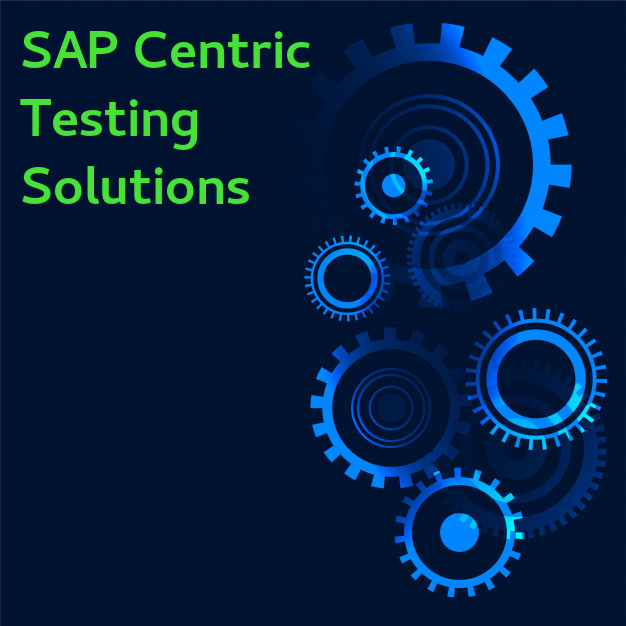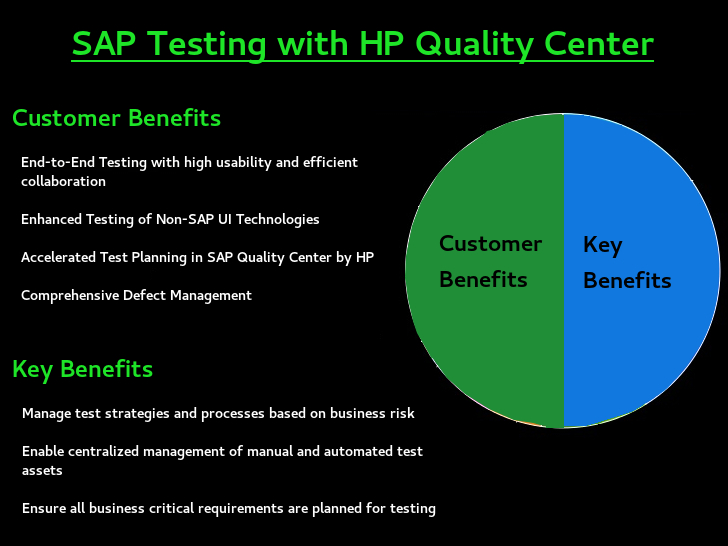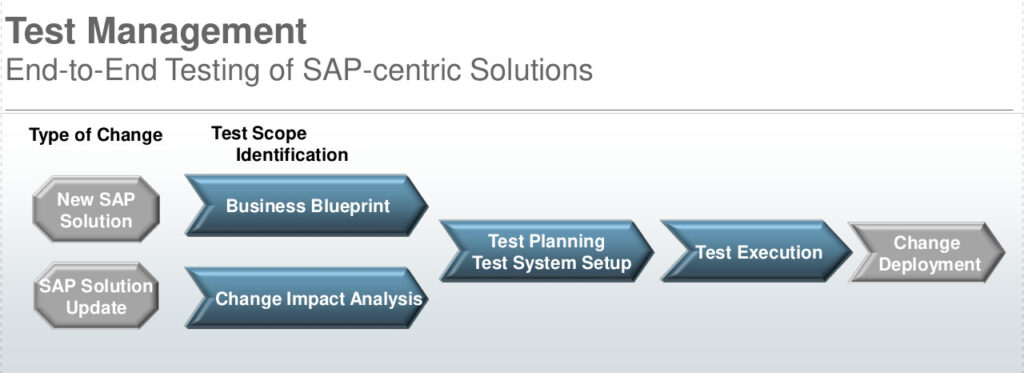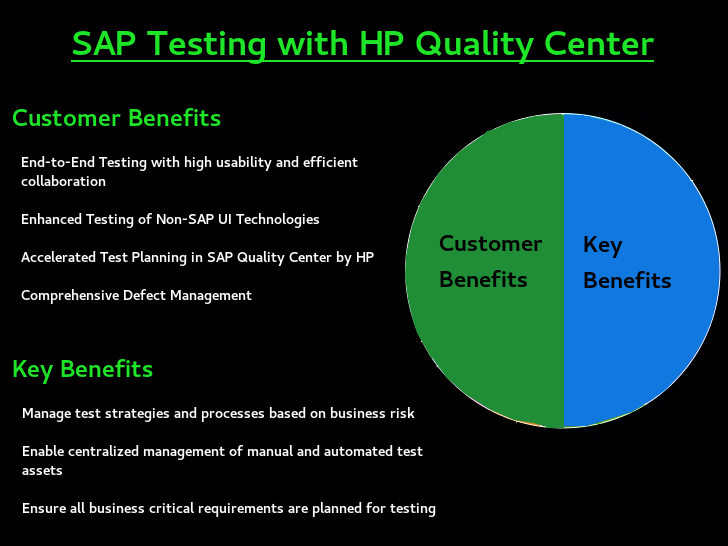
Software Test Cycle must be well planned as it is associated with cost, speed, and quality. Digital Cloud makes it easier for organizations to strike this balance.
High level Quality assurance for best-in-class customer experience
In the digital order of light-speed releases, trends in QA and testing align closely with those in software development. Ensuring a seamless customer experience is now a top QA priority for the executive management, according to the World Quality Report 2019-2020. So decision-makers are turning their attention to the role of software quality in optimizing customer experience.
Digital Cloud Testing Services clients benefit from:



Digital Cloud offers a broad range of SAP testing services and solutions designed to minimize application failures and help companies achieving measurable business results. With a comprehensive set of structured methodologies, deep expertise, and field-proven test tools, testing services from SAP can help customer organizations to:
The experts from our consulting department work closely with each client to determine the optimal blend of advice, guidance, procedures, and tools that may be needed to produce a given outcome. Companies may want help creating a center of excellence, an expert assessment of current testing methods, a blueprint for automating test processes, or a strategy for reducing performance risk. Depending on the specific goals, test resources, and IT landscape, the experts at Digital Cloud work closely with IT professionals and business leaders of the customer to create a package of services exactly suited to their needs.
Delivering Quality, Performance, and Reliability
Application testing should not be an isolated event that occurs once during implementation. To create business value, companies need a holistic approach that includes designing a cohesive strategy.
Digital Cloud offers comprehensive testing solutions and services that help to:
Strategy and Assessment Advisory Services
Digital Cloud delivers strategy and assessment services that help customers make better decisions their overall testing philosophy, practices, staffing, and budget. An experienced assessment team works closely with the customer’s IT and business leaders to develop both a long- and a short-term road map.
Advisory services from Digital Cloud show how customers can:
Business Challenges
Business Benefits
Services Offered
SAP-Centric solutions are changed on a regular basis through SAP or customer triggered change events which require our customers to test their business processes thoroughly.
Mission-critical operations is a challenge. While the flexibility of SAP-Centric solutions rises, customers have to manage complexity, risks, costs, as well as skills and resources efficiently. Customers have to run and incrementally improve the IT solution to ensure stable operation of the solution landscape. This includes the management of availability, performance, process and data transparency, data consistency, IT process compliance, and other tasks.

We provides the following standards for solution operations:
Developer tests
Tests carried out by software developers at the lowest technical level during the Build phase. Besides functional aspects, these tests also include non-functional aspects
Unit tests
Lowest level of functional test which encompasses individual transactions or function modules
Scenario tests
Assessment of multiple related transactions that form a business scenario, such as Order to Cash or Procure to Pay
Integration tests
Functional correctness test that examines correct execution of processes crossing various SAP applications as well as interfaces to partner or 3rd party applications
User acceptance tests
Functional tests performed by future users of the changed functionality. Primary goals of user acceptance tests are to receive the formal acceptance of the business units and to detect usability problems
Regression tests
Verification that system changes did not affect the functionality and business process behavior and their results unintentionally. Mostly the effects of changes are known and can be foreseen but sometimes the effects are not completely transparent
Developer tests
Tests carried out by software developers at the lowest technical level during the Build phase with focus on technical aspects such as correct handling of interfaces
Performance tests
Performance testing is a technical system test that measures the throughput and response times of the system under test
Security Tests
Tests to check user access and authorizations, segregation of duty (SOD), data security and other security related aspects.
The definition of a company specific test strategy is the most important activity before performing any test activities. The test strategy describes the approach for test management. It provides guidance and should describe the following aspects:
Our Test Project Preparation
Our Test Project preparation is unique.
Test Concept
Review of the test strategy in the context of the planned test project. Dependent on the type of change the suitable test types and test approach must be determined and documented in a test concept.
Test Objectives
The goal of the test activities should be described via a transparent set of test objectives. Requirements to enable the start of test activities, quality goals as well as test exit criteria should be formulated to guide test preparation and management of expectations.
Test Tools
Selection of available test tools which are appropriate for the planned test cycle to support the scoping, planning, execution and analysis of the planned test activities Test Budget. The test manager must plan for a sufficient test budget regarding financial resources, availability of manual testers, test systems, IT equipment, rooms, etc.
Timeline
Planning of all important dates in the context of the test project, such as
Our Test Scope Identification
The identification of the test scope is a crucial activity that determines the time and effort needed to perform the test. Since changes to SAP-Centric solutions constitute the main cause of various testing activities, it is important to differentiate between the types of SAP solution change.
When a SAP solution is implemented, for example SAP CRM as an enhancement to an existing SAP ERP implementation, a number of business processes are adapted, configured, and documented in the Business Blueprint.
Planned changes to a SAP solution are motivated by a wide range of reasons:
Once the test scope has been identified, the tests themselves can be planned. First, the user department collects the business requirements from the Business Blueprint. These may then be supplemented with test requirements by the Q&A department. On the basis of these test requirements, manual and potentially also automatic test cases are created, or existing ones are reviewed and adapted.
Test Execution
After the tests have been planned and the test systems are available and contain test data, testing can begin. Software developers perform unit tests beforehand in the development systems. Depending on the type and scope of the test cycle, various types of functional tests are performed
Test documentation
Every test that is executed is logged and documented with test notes. A test status is set in all cases, either manually or automatically. If the system responds in an unexpected way during manual testing, the tester records an incident in the corresponding incident management system
Integration Validation
In light of the complexity and heterogeneity of modern software solutions, integration validation is recommended especially for important business processes. This involves gathering and subsequently evaluating a substantial amount of data from the software applications that are active while a given business process is being executed
Load Tests
If large-scale changes are made or new software solutions are implemented, load tests should be performed before these are used in production. These tests simulate a situation in which the expected load is simulated
Test Status Reporting
Throughout the entire test cycle, test coordinators monitor the test status and progress, as well as the processing status of problems that have been reported
Quality Center tool contains all the functions needed to manage manual and automatic tests. The requirements module is where test requirements for the business processes can be stored.
Manage test cases based on business and test requirements
Key benefits
Key capabilities
Customer Benefits

Many companies aspire to using automatic test cases to handle regression tests in particular, since such test cases present a means of reducing the number of manual testers while simultaneously increasing test coverage. Unfortunately, automatic test cases are easily damaged by changes to the user interface or the process flows of SAP applications. In turn, this leads to considerable maintenance effort for automatic test cases. This is where SAP TAO comes in.
Steps are involved in creating SAP TAO-based test cases:
Automatic test cases created with SAP TAO are easier to adapt because they are not recorded as one piece but rather consist of multiple components. If a test case is damaged, only the test component concerned is replaced to repair the test case and make it executable again.

Digital Cloud [DIGITAL CLOUD] is an Information Technology Services and Consulting Company. As the world is marching towards digital transformation and the clients business needs becoming more challenging, we are at the forefront to help clients meet their business goals. Adapting Latest in-demand trending technologies such as SAP ERP, SAP S/4 HANA, SAP Cloud Platform, Cloud Solutions, Artificial Intelligence, Machine Learning, Automation etc are need of the day for clients to succeed in today’s digital world.
